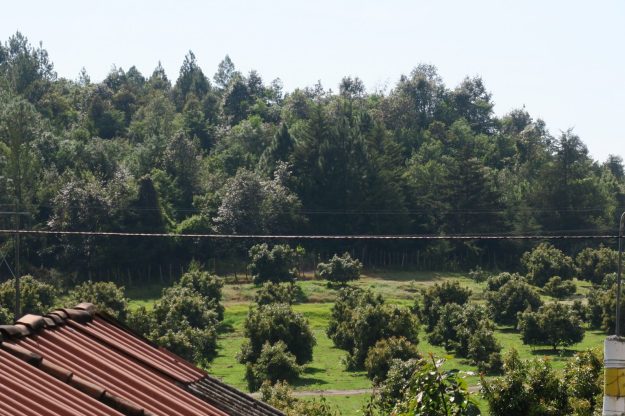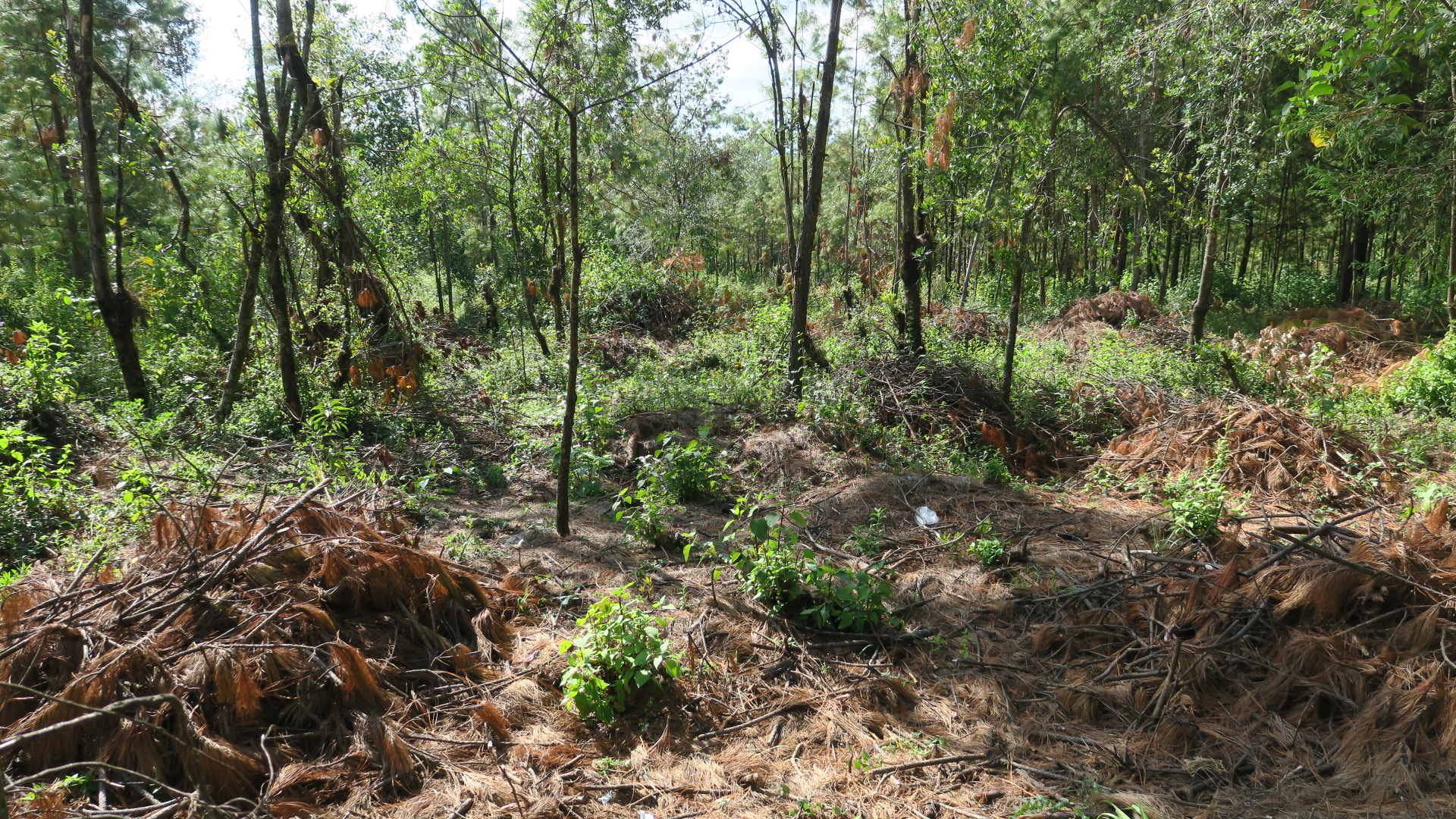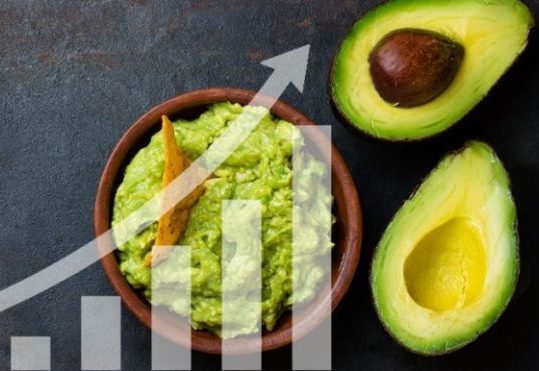As we settle into our easy chairs for Super Bowl LVII this Sunday, let’s pause a moment as we we scoop that guacamole onto our tostadas.
The Super Bowl ranks as the biggest day each year for avocado consumption in the United States–specifically, in the form of guacamole. (Cinco de Mayo is second). Approximately 130,000 pounds, or 65 tons, of avocados will be imported to the U.S. for this single-day event, according to the nonprofit trade group, the Association of Avocado Exporting Producers and Packers of Mexico.
The attributes of the creamy green fruit are well known. Avocados boast a luscious, satisfying taste, enormous health benefits, and versatile usage.

An avocado farm, in foreground, abuts the forest near Zitácuaro, a gateway to the monarch butterfly roosting sites. Photo by Estela Romero, Journey North
But what did it take to get that guacamole in the bowl?
It’s complicated. An estimated 80% of the 2.6 billion pounds of avocados consumed in the United States last year came from Mexico. Until recently, the only state in Mexico authorized to export avocados to the U.S. was Michoacán, the home of the monarch butterfly roosting sites. Jalisco state was authorized to export avocados to the U.S. in July of 2022.
That means the avocados that make your guacamole possible very likely come from Michoacán, a region where the Goldilocks climate and rich, volcanic soil create a perfect ecosystem not only for overwintering monarch butterflies, but for avocado production.
Avocado demand has exploded in recent years, creating a $3 billion export market and earning the lucrative superfood the nickname oro verde, or “green gold” in Mexico.
A less flattering label: “blood fruit.” Its profit potential has led Mexican crime cartels to increasingly insert themselves into the avocado business. Reports of intimidation and extortion, narco tariffs, farm seizures, “disappearances” and murders of growers are are not uncommon. News accounts describe continuing encroachment of cartels on Mexico’s 30,000 avocado growers and 74 packers–the vast majority of whom run small family farms of less than five acres, according to the Avocado Institute of Mexico.
In a disturbing, 43-minute video documentary published last month by the Canadian news magazine W5, Narco Avocados: Violent drug cartels are taking over Mexico’s avocado industry, correspondent Avery Haines digs into the details, interviewing avocado farming vigilantes and cartel bosses alike.
Haines starts out on an avocado farm with “Gabriel,” whose real name and identity are omitted for his own safety. He is “armed to the teeth,” she says, and forced to pay one cartel for protection from another, while also defending his family and farm with his personal AR-15 assault weapon.
“If you’re doing well, they’ll kill you or disappear you…they’ll pull you and your family out of your house and take away your orchard..and take all the money,” says Gabriel through a translator. He adds that the cartels steal land. “They just say, ‘I like your land. I like your house. You have to vacate it, you have 24 hours to leave’ and if you don’t, they come and kill you.”
The apparent murder of a beloved butterfly evangelist brought the issue into focus in 2020.
That was the year that monarch butterfly advocate Homer Gómez Gonzalez, manager of the El Rosario site, the state’s most visited monarch butterfly sanctuary, was found murdered, his body dumped in an artesian well that January. The longtime sanctuary manager and widely admired butterfly protector, age 50, had been missing for two weeks.
Shortly thereafter, part-time sanctuary guide Raul Hernandez also turned up dead, with a blunt blow to the head. The two murders remain unsolved, but many speculate that cartels targeted Gómez for his activist stance in resisting efforts to deforest the area to create more space for avocado farms.
Just this week, a petition was submitted to the Commission on Environmental Cooperation (CEC), a trinational, intergovernmental conservation organization representing Canada, the U.S. and Mexico, requesting the organization evaluate a complaint. Filed February 2, it asserts that “Mexico is failing to effectively enforce its environmental laws to protect forest ecosystems and water quality from the adverse environmental impacts of avocado production in Michoacán, Mexico.”

Just six miles from the monarch butterfly sanctuary near the municipality of Angangueo, land is being cleared for more avocado farms. –Photo by Estela Romero, Journey North
A submission to the CEC constitutes the first step in the Submissions on Enforcement Matters (SEM) process and can lead to an investigation of technical, scientific, and legal information as well as interviews with government officials and analysis from independent experts. Read the full complaint here.
So should butterfly advocates and guacamole loving Americans stop eating avocados?
“No, they should keep consuming them,” said forest researcher Cuauhtémoc Sáenz-Romero at the Institute for Research on Natural Resources at the Michoacán University of San Nicolás de Hidalgo in Morelia. Sáenz-Romero has studied the high elevation oyamel fir forests where the monarch butterflies roost extensively.
The forester acknowledges that avocado production taxes the ecosystem with its demands for scarce water, but points out the industry’s importance as a source of jobs and regional income. In the event of an effective boycott, what could rural employees do? he asked. “They might try to migrate to the U.S. and increase the current humanitarian tragedy that’s going on.”
Saénz-Romero suggested, instead, a system of independent and ecologically sustainable international certifications of “green” or “sustainable” avocado production, as happens today with timber and fair trade coffee. He points to “green wood” programs established by The International Forest Stewardship Council already in place in Mexico’s indigenous forest communities in Michoacán, Oaxaca and elsewhere. The timber is certified only after the logging industry complies with a list of sustainability requirements.
Monarch butterfly conservationists in the U.S. have also weighed in.
David James, an entomologist and monarch researcher at Washington State University focused on the California population, said that only “a tiny proportion” of Mexican avocados are grown near the overwintering area. “So, any avoidance of buying Mexican avocados would likely have no impact, unless you know exactly where they originated,” he said.
Andy Davis, migration studies expert and assistant research scientist at the University of Georgia’s Odum School of Ecology, admits that he loves avocados. He noted how unfortunate it is that that one of the best places in the world to grow avocados also happens to be the same place where monarch butterflies overwinter.
“There are poor farmers just trying to make a living, then there are cartels encroaching into the business, and there are guns and violence too. All of this is superimposed on the needs of the monarchs, which need these same high-elevation landscapes for three months of the year. The good news is that so far, the North American monarch population is faring quite well, despite these pressures on their winter quarters, and despite the doom and gloom often reported in the media.”
Longtime monarch researcher and conservationist Karen Oberhauser, who founded the Monarch Joint Venture (MJV) pollinator advocacy organization and now serves as director of the University of Wisconsin-Madison Arboretum, said she’s pretty passionate about the avocado issue, having watched the spread of farms near the monarch wintering sites for two and a half decades.
“You can’t travel in the area without noticing avocado plantations creeping higher and higher up the mountains,” said Oberhauser via email. She added that the avocado boom resulted from the North American Free Trade Agreement (NAFTA) in 1990, (which also gave birth to the previously noted CEC). NAFTA made Mexican avocados more affordable than those produced in the U.S., she pointed out. “I remember when avocados were pretty expensive, and you’d maybe buy one for a special occasion. But now they’re much cheaper.”
Oberhauser will NOT be dipping into guacamole this Sunday.
“I personally do not purchase avocados in the U.S., even in restaurants, although I do love them and consume them in Mexico. It feels complicated to support this out-of-control growth in production that has resulted in so much forest destruction. I realize I’m not going to solve this problem through my personal actions, but it makes me feel like I’m at least not contributing to the problem.”
Wendy Caldwell, MJV executive director summed up the quandary: “As consumers, it is important for us to make informed decisions that are right for us and to continue to work toward a better understanding of how systems work, including understanding perspectives that may be different from our own.”
TOP PHOTO: Image courtesy of Association of Avocado Exporting Producers and Packers of Mexico
Related posts:
- Entry to Mexico’s most popular butterfly sanctuary should cost more than $2.77
- Courtship flights, late departures define late season visit to Piedra Herrada
- Pollinator habitat initiative reaches 1,024 gardens and growing
- Enchanting trek includes monarch butterfly ‘rush hour’ at Piedra Herrada
- Dreamy visit to roosting sites results in rabies shots, credit card fraud
- On the monarch butterfly trail in Mexico, “explosions,” joy, and hasta la vista en Texas
Like what you’re reading? Don’t miss a single post from the Texas Butterfly Ranch. Sign up for email delivery, like us on Facebook, or follow us on Twitter, @monikam or Instagram.


Organizations like the Nature Conservancy have a lot of experience in combining industries like farming and ecotourism to the benefit of both.
I’ve been educating people about avocado farming for years.
Basically they done care because they like avocados.
I tell people not to eat shrimp if they like sea turtles and other oceanic wildlife but it even falls on deaf ears to biologist friends.
Thanks for the article—I was ready to boycott avocados but will try to reduce my consumption instead.
I had no idea farming avocados has become a source of violence and trauma. Thank you for a truly informative article!
Very sad that it comes to this… No respect for other people’s well-being and property.
I don’t see how the avocado industry in Michoacan could be a threat to overwintering monarchs because:
1) The butterflies cluster at between 10,200 – 10,900 feet and the avocado orchards are planted below 9,000 feet. That’s why no photos exist showing avocado orchards getting near monarch cluster trees.
2) Along the California coast it’s routine for avocado and citrus tree orchards to be planted right next to monarch eucalyptus tree overwintering groves and they have co-existed with the butterflies for decades. Enter these GPS coordinates into google maps or google earth to see an example of a monarch eucalyptus overwintering grove near Santa Barbara, Calif. that’s surrounded by avocado orchards: 34.455735, -119.977507
I will never eat them. Simple
The cartel chopping down the forest where monarchs reside, selling the wood to US companies then planting avacodos where the trees once stood to also sell the the US, is just one more thing that needs to end before we all go extinct with the butterfly.
We need to find some good lawyers to sue these companies buying these products. They need to be stopped if we are going to stop the cartel and save the forest.
All chemical companies like Monsoto should be put in jail too, for knowingly destroying the planet and people’s health.
If everyone would just stop buying wood and avocados, turn off their AC, not buy cow products, maybe we could save the earth, but it will never happen by the majority waking up to stop their own contributions. It needs to be big corporations shit down legally from being able to contribute by buying and selling these products.
I just wish Jesus would come back already and stop all this nonsense. It is so depressing to just sit back and try to do something about it. But feel like your hands are tied and you just have to keep seeing things like polar bears starving to death because of humans and you can’t do anything about it.
I am going to keep trying to do something anyway.
The butterfly was here before man was here why should they have to die for our wants why cant there be a way for all of us to live with each other, and if there need to be a change why should it be between them and us we need to change before thy do.